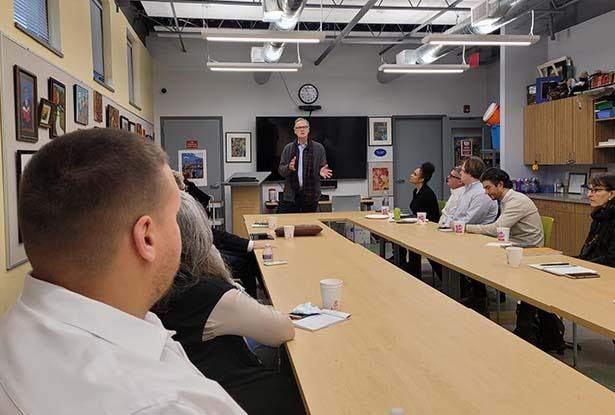Reversing Urban Blight in Trenton’s Coalport Neighborhood
Reversing Urban Blight in Trenton’s Coalport Neighborhood
UNION, N.J. — Kean University experts in urban policy and architecture joined community leaders in Trenton recently to develop strategies for reversing the blight caused by redlining in the city’s Coalport neighborhood.
Redlining — the refusal of investors to build or open businesses in a community due to the race or ethnicity of its residents — has contributed to distressed cities in New Jersey for decades.
A meeting at the Trenton Area Soup Kitchen on how to “undesign the redline” included leaders from Kean’s John S. Watson Institute for Urban Policy and Research and its Michael Graves College School of Public Architecture, as well as Trenton officials, architects and other community builders. They toured the Coalport neighborhood and strategized on revitalization projects for Coalport and neighborhoods like it that also protect current residents.
“We are delighted to be involved from the very beginning with a project that has incredible potential to transform New Jersey’s urban communities,” said Kean President Lamont O. Repollet, Ed.D. “Generating sustainable strategies for the resolution of social and economic challenges across the state reinforces Kean’s mission as New Jersey’s urban research university and encourages our faculty and students to engage in applied research that benefits urban communities.”
While the Coalport neighborhood was the focus of the meeting, the ideas shared were intended to be transferrable to similar communities throughout the state.
Joseph Youngblood II, Ph.D., J.D., Kean senior vice president for external affairs, said Kean is in a position to advance thoughtful processes that put an end to historic inequities scarring urban communities.
“Community-driven and -owned processes are a prerequisite for equitable, inclusive and sustainable community transformation,” he said. “We have a tremendously talented interdisciplinary team at Kean who can support community-driven engagement, capacity building, and design processes that will transform Coalport without displacing people.”
The gathering was organized by April De Simone, a principal with Trahan Architects in New York City, who has worked to reverse the devastation caused by redlining in Coalport. A key topic of the recent meeting was how to further engage the community and neighborhood assets and empower residents to promote and contribute to equitable revitalization — in part through entrepreneurial training that could include urban design classes.
The project fits squarely within the mission of the Watson Institute’s Urban Mayors Policy Center and aligns with the goals of the school of architecture, which is committed to giving Kean students real-world, public-service experience in the field.
“This project is at the heart of the mission of the Michael Graves College: to work with a local community so that design and architecture impact its citizens in a positive manner,” said David Mohney, FAIA, the dean of the College, who attended the meeting with several faculty members.
Also present were representatives of KPF, a New York-based architecture firm, and the Garden State Agrihood Project, a nonprofit organization that promotes community design that integrates agriculture for the purpose of food production, education, research and local community development.
“The Watson Institute drives transformation through collaboration between authentic community partners and higher education,” said Barbara George Johnson, J.D., vice president of external affairs and urban policy and research at Kean. “We are grateful for the tenacity and vision of April De Simone in reviving conversations around community-led and -owned investment in the Coalport neighborhood.”
PHOTOS / CAPTIONS:

Michael Graves College Dean David Mohney, FAIA, leads a discussion at the recent meeting on revitalizing Trenton's Coalport neighborhood. (Photo Credit: Kean University)
ABOUT KEAN UNIVERSITY
Founded in 1855, Kean University is one of the largest metropolitan institutions of higher education in the region, with a richly diverse student, faculty and staff population. Kean continues to play a key role in the training of teachers and is a hub of educational, technological and cultural enrichment serving more than 16,000 students. The University’s six undergraduate colleges offer more than 50 undergraduate degrees over a full range of academic subjects. The Nathan Weiss Graduate College offers seven doctoral degree programs and more than 70 options for graduate study leading to master’s degrees, professional diplomas or certifications. With campuses in Union, Toms River, Jefferson and Manahawkin, New Jersey, and Wenzhou, China, Kean University furthers its mission by providing an affordable and accessible world-class education. Visit www.kean.edu.





